Mary Anne Yarde's Blog: The Coffee Pot Book Club , page 11
March 29, 2021
Have a sneak-peek between Toni Mount's fabulous book - The Colour of Evil #HistoricalFiction #Excerpt #BlogTour @tonihistorian @EKeysian @BritonandDane @coloursofunison


March 29th – April 2nd 2021
Publication Date: 25 March 2021Publisher: Madeglobal.com
Page Length: 334 Pages
Genre: Historical Fiction / Mystery
‘The Colour of Evil’
Every Londoner has money worries, and talented artist and some-time sleuth, Seb Foxley, is no exception.
When fellow craftsmen with debts to pay are found dead in the most horrid circumstances, fears escalate. Only Seb can solve the puzzles that baffle the authorities.
Seb’s wayward elder brother, Jude, returns unannounced from Italy with a child-bride upon his arm. Shock turns to dismay when life becomes more complicated and troubles multiply.
From counterfeit coins to deadly darkness in London's worst corners. From mysterious thefts to attacks of murderous intent, Seb finds himself embroiled at every turn. With a royal commission to fulfil and heartache to resolve, can our hero win through against the odds?
Share Seb Foxley’s latest adventures in the filthy streets of medieval London, join in the Midsummer festivities and meet his fellow citizens, both the respectable and the villainous.
We are stopping over on three fabulous blogs today:
Let Your Words Shine…Seduction, Scandal & SpiesM J Porter’s Official BlogTour Schedule

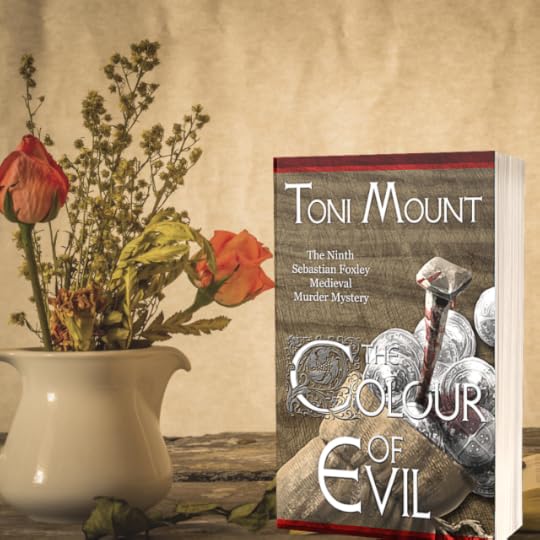
Have a sneak peak between the covers of Heather Wardell's fabulous book — Fiery Girls #HistoricalFiction #MustRead #Excerpt @HeatherWardell
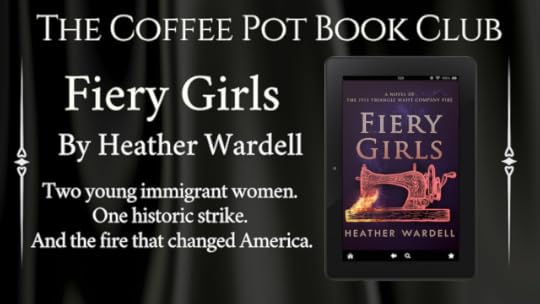
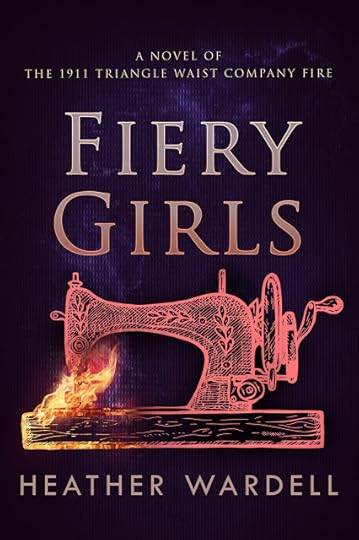
Publisher: Heather Wardell
Page Length: 324
Genre: Historical Fiction
Two young immigrant women. One historic strike. And the fire that changed America.
In 1909, shy sixteen-year-old Rosie Lehrer is sent to New York City to earn money for her family’s emigration from Russia. She will, but she also longs to make her mark on the world before her parents arrive and marry her to a suitable Jewish man. Could she somehow become one of the passionate and articulate “fiery girls” of her garment workers’ union?
Maria Cirrito, spoiled and confident at sixteen, lands at Ellis Island a few weeks later. She’s supposed to spend four years earning American wages then return home to Italy with her new-found wealth to make her family’s lives better. But the boy she loves has promised, with only a little coaxing, to follow her to America and marry her. So she plans to stay forever. With him.
Rosie and Maria meet and become friends during the “Uprising of the 20,000” garment workers’ strike, and they’re working together at the Triangle Waist Company on March 25, 1911 when a discarded cigarette sets the factory ablaze. 146 people die that day, and even those who survive will be changed forever.
Carefully researched and full of historic detail, “Fiery Girls” is a novel of hope: for a better life, for turning tragedy into progress, and for becoming who you’re meant to be.

Chapter One
Rosie
August 22, 1909
"Rosie Lehrer!"
Fear holds me still for a moment, then I realize that if I take too long, I might lose my chance. If I even have a chance.
My legs shaking so much I feel almost as though I'm still on the ship, I manage to walk forward to the girl, a little older than me, who called my name.
"I'm Cecilia Greenstone, Rosie, and this man here is your inspector," she says in Yiddish, gesturing to the stern-faced man in a black suit who sits, perched on a high stool, with one hand resting atop a messy stack of papers on a small desk before him. "I will be your interpreter. Unless you speak English?"
"Not well enough— I mean, I did try to learn, but—" I bite my lip. "Yiddish, please." Not that it'll matter what language we use, once she learns the truth about me.
She nods. "Yiddish is fine. Please do speak as loudly as you can."
I already was.
"Have you any relatives here already?"
"No," I admit, trying to hide the trembling of my hands in the folds of my skirt. "No, I do not."
Should I keep my eyes on Cecilia? It would ordinarily be polite, since she's the one speaking. But I know that the questions she asks aren't hers, they're the inspector's. He's the one who matters. But he terrifies me.
Cecilia moves a little closer, cupping her hand around her ear. "Will your husband—no, you're only sixteen. Your father, then? Will he arrive soon? Or perhaps a brother?"
I shake my head, misery sweeping over me.
She moves closer still and lays her hand on my shoulder. "Rosie, it's all right. Answer the questions and I'll be able to help you."
"You won't," I say, fighting back a sob. "I'm not allowed."
"Not... what do you mean?"
"I am alone," I admit. "I came here alone. My parents didn't know... we thought I could... but... on the ship..." I stop, unable to find words to describe the horror I felt when, on the very day my ship departed, I learned that a girl alone would not be permitted into America.
Cecilia squeezes my shoulder. "It is all right, Rosie. No, you can't leave Ellis Island alone, but you won't have to. If you do well, if you answer my questions carefully, I have people who can help you."
I want to believe this. I need to. But I've only just met her.
"Trust me," she says, looking into my eyes and nodding as if she can see what I'm thinking. "Trust me, Rosie. I promise you. I work with the National Council of Jewish Women, and we can find you a room and a job and—"
The inspector barks a few words, which I can't quite hear, and Cecilia turns back and answers him. He pulls his mouth to one side as if he doesn't like what she said, but he gives a sharp nod."We must go through the questions quickly, Rosie. Do your best."
My father would call me foolish, but I find myself trusting her. "All right."
"And be loud!"
I've been raised to be a quiet girl, a good girl. But here, I must be different. With so many potential immigrants in this huge high-ceilinged hall, each with an interpreter helping an inspector decide whether they should be allowed to enter America, everyone's almost shouting to be heard over everyone else, and I need to make myself do the same. I need to take a deep breath and shout my answers, though the air stinks of the fear of people who haven't bathed for weeks.
But how, when I'm so scared I can hardly speak at all?
Cecilia nods encouragingly and gives me a small smile, barely a twitch of her lips, and I try to calm myself by looking only at her gentle face below her thick brown hair swept up beneath a pretty gray hat.
I think she cares about me.
I think the inspector does not.
Men in uniform never care about Jews, it seems to me, unless they're deciding how to get rid of us, and his cold eyes and set jaw frighten me.
"Rosie, tell me, why have you come here?"
I take such a deep breath that my corset creaks then push out my words as loudly as I can. "I am here to earn the money to bring my family to America. My parents, my brother, my two young sisters."
She raises her eyebrows and I know she's thinking the same thing I am: it will take me years to earn passage for five people.
She doesn't say it, though. Instead, she asks a few more questions, about my background and what I know about America, then gives me a smile that reminds me of how my mother can tell me I have managed to impress her without speaking a word.
As my heart begins to fill with hope, she turns and says something to the inspector.
Though I can't hear her, he obviously can, because he answers her then waves his hand toward the staircases behind him as if shooing away a fly.
"You passed," Cecilia says to me, still in Yiddish. "Welcome to America, Rosie."
To my shame, my eyes fill with tears and I barely manage to hold back a sob.
I have spent nearly two weeks worrying in every waking moment. Though I tried to be optimistic, I couldn't. I was certain that once we reached New York I'd be put right back on the stinking horrible ship and forced to return to Belostok, to Russia. To the Pale of Settlement, where we Jews are forced to live. I've had nightmares every night about it.
But Cecilia told me I would be allowed in, and she was right.

Amazon • Barnes & Noble • Apple Books • Google Play • Kobo

 Heather is a natural 1200-wpm speed reader and the author of twenty-two novels. She came to writing after careers as a software developer and elementary school computer teacher and can’t imagine ever leaving it. In her spare time, she reads, swims, walks, lifts weights, crochets, changes her hair colour, and plays drums and clarinet.
Heather is a natural 1200-wpm speed reader and the author of twenty-two novels. She came to writing after careers as a software developer and elementary school computer teacher and can’t imagine ever leaving it. In her spare time, she reads, swims, walks, lifts weights, crochets, changes her hair colour, and plays drums and clarinet.Connect with Heather:Website • Twitter • Facebook • Instagram
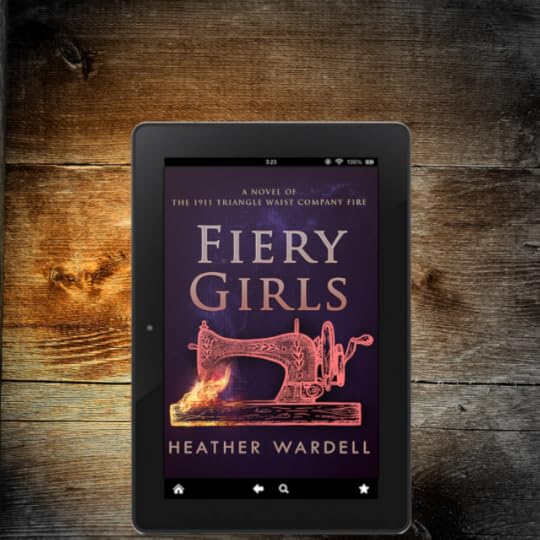
Welcome to Day 7 of the blog tour for The Dark Shadows of Kaysersberg By Michael Stolle #HistoricFiction #BlogTour @MichaelStolle16 @Beatric09625662

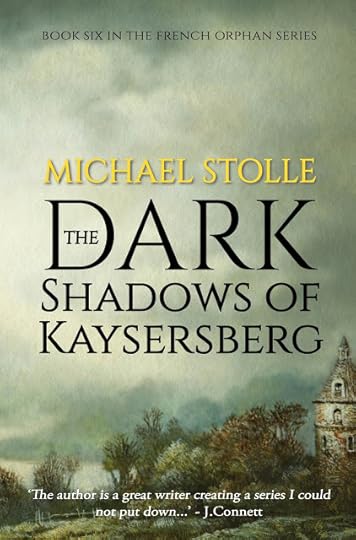
February 16th- April 20th 2021
Publication Date: 27th December 2020
Publisher: Independently Published
Page Length: 223 Pages
Genre: Historical Fiction / Romance / Adventure
Armand de Saint Paul, the younger son of a great and rich noble house, is leading a carefree life in Paris, dedicating his time to such pleasures as gambling, hunting and amorous pursuits.
Unexpectedly, Armand has to defend the honour of his house in a duel that transpires to be a deadly trap, set up by a mighty foe of the house of Saint Paul.
Will Armand be able to escape the deadly net of intrigue that soon threatens to destroy him?
How can a young man deal with love, when it’s no longer a game, but a dream beyond reach?
The leading question is: What is going on behind the façade that is Castle Kaysersberg,where nothing is as it seems to be … until the day when the dark shadows come alive?
Head over to Candlelight Reading where The Dark Shadows of Kaysersberg is in the spotlight!
Click Here.
Tour Schedule

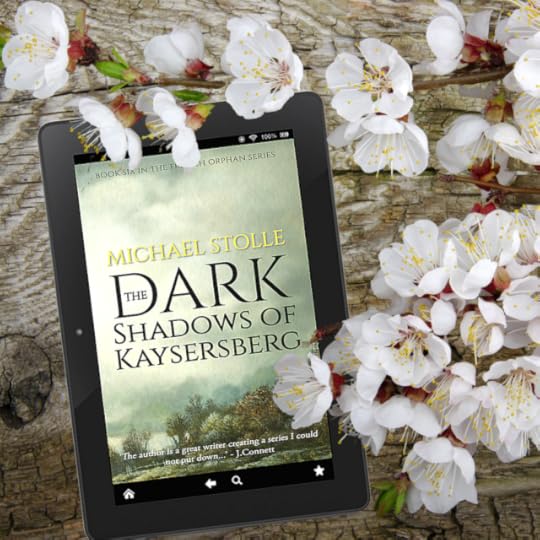
Welcome to Day #3 of the blog tour for Forsaking All Other by Catherine Meyrick #HistoricalFiction #HistoricalRomance #BlogTour @cameyrick1 @jroberts1324

16th March – 18th May 2021
Publication Date: 16th March 2018Publisher: Courante Publishing
Page Length: 308 pages
Genre: Historical Fiction/Historical Romance
England, 1585.
Bess Stoughton, waiting woman to the well-connected Lady Allingbourne, has discovered that her father is arranging for her to marry an elderly neighbour. Normally obedient Bess rebels and wrests from her father a year's grace to find a husband more to her liking.
Edmund Wyard, a taciturn and scarred veteran of England’s campaign in Ireland, is attempting to ignore the pressure from his family to find a suitable wife as he prepares to join the Earl of Leicester’s army in the Netherlands.
Although Bess and Edmund are drawn to each other, they are aware that they can have nothing more than friendship. Bess knows that Edmund’s wealth and family connections place him beyond her reach. And Edmund, with his well-honed sense of duty, has never considered that he could follow his own wishes.
With England on the brink of war and fear of Catholic plots extending even into Lady Allingbourne’s household, time is running out for both of them.
Love is no game for women. The price is far too high.
Head over to The Books Delight for a fabulous review.
Click Here.
Tour Schedule

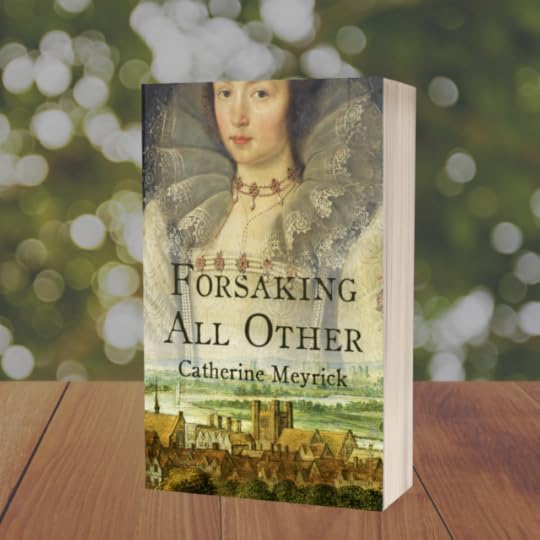
Welcome to Day #6 of the blog tour for Ropewalk; Rebellion. Love. Survival (The Ropewalk series) by H D Coulter #HistoricalFiction #Ropewalk #BlogTour @coulter_hd @cameyrick1@TheBookBandits1
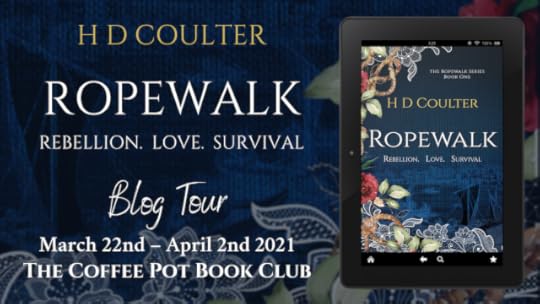

March 22nd – April 2nd 2021
Publication Date: 23rd November 2020Publisher: Independently Published
Page Length: 243 Pages
Genre: Historical Fiction
The North of England, 1831.
The working class are gathering. Rebellion is stirring, and the people are divided.
Beatrice Lightfoot, a young woman fighting her own personal rebellion, is looking for an opportunity to change her luck. When she gains the attention of the enigmatic Captain Hanley, he offers her a tantalising deal to attend the May Day dance. She accepts, unaware of the true price of her own free will.
Her subsequent entanglement with Joshua Mason, the son of a local merchant, draws all three into a destructive and dangerous relationship, which threatens to drag Beatrice, and all she knows into darkness.
Now, Beatrice must choose between rebellion, love and survival before all is lost, and the Northern uprising changes her world forever.
Our first stop of the day is over on Catherine Merrick’s Official Blog for a sneak-peek between the covers.
Click Here.
Our second stop of the tour is over on The Book Bandit's Diary for a fabulous review.
Click Here.
Tour Schedule

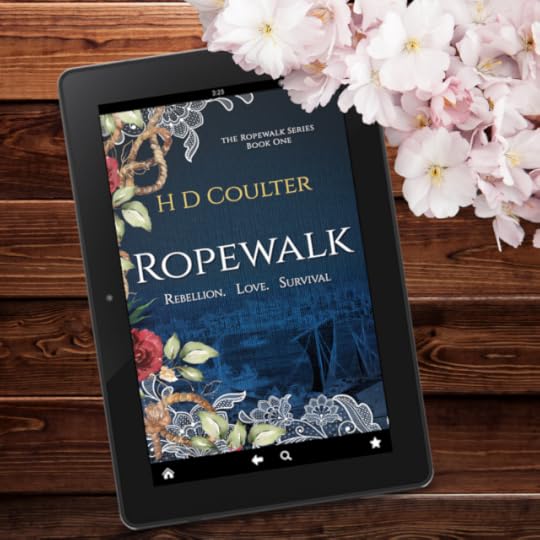
March 28, 2021
Welcome to Day #1 of the blog tour for The Colour of Evil by Toni Mount #HistoricalFiction #Mystery #BlogTour @tonihistorian @loup_dargent @CraftygasheadZo @CaigJamie


March 29th – April 2nd 2021
Publication Date: 25 March 2021Publisher: Madeglobal.com
Page Length: 334 Pages
Genre: Historical Fiction / Mystery
‘The Colour of Evil’
Every Londoner has money worries, and talented artist and some-time sleuth, Seb Foxley, is no exception.
When fellow craftsmen with debts to pay are found dead in the most horrid circumstances, fears escalate. Only Seb can solve the puzzles that baffle the authorities.
Seb’s wayward elder brother, Jude, returns unannounced from Italy with a child-bride upon his arm. Shock turns to dismay when life becomes more complicated and troubles multiply.
From counterfeit coins to deadly darkness in London's worst corners. From mysterious thefts to attacks of murderous intent, Seb finds himself embroiled at every turn. With a royal commission to fulfil and heartache to resolve, can our hero win through against the odds?
Share Seb Foxley’s latest adventures in the filthy streets of medieval London, join in the Midsummer festivities and meet his fellow citizens, both the respectable and the villainous.
We are so excited to be taking The Colour of Evil on tour. We are stopping over on three fabulous blogs today, where you can have a sneak-peak between the covers.
Tour Schedule

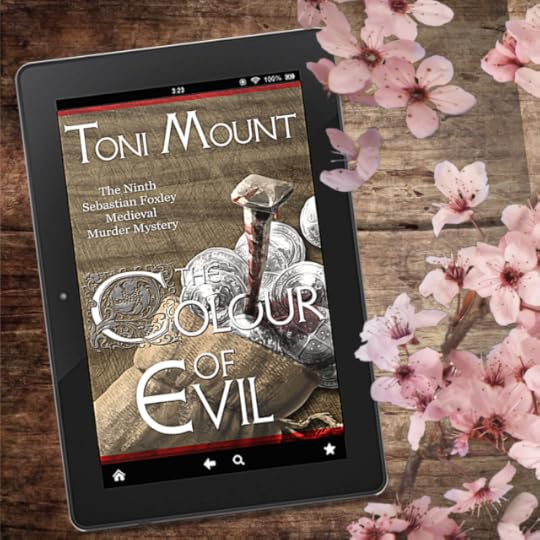
Join The Coffee Pot Book Club in conversation with #HistoricalFiction author, Paul Bernardi #HistoricalFiction #Interview #KindleUnlimited @Paul_Bernardi @SharpeBooks
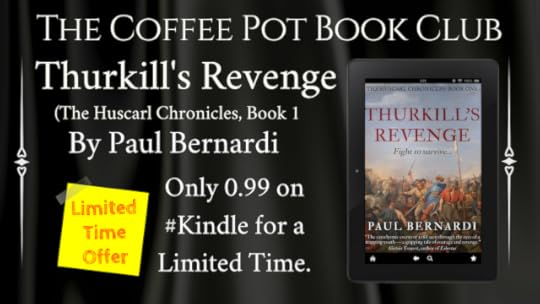
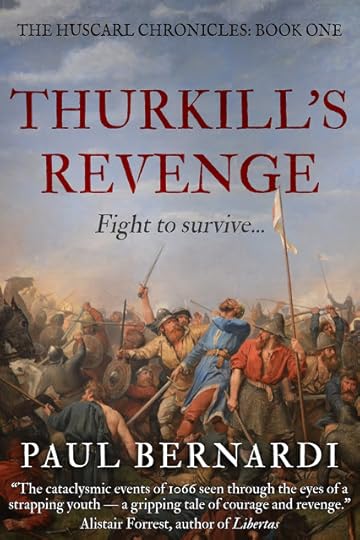
Publication Date: 15th February 2021
Publisher: Sharpe Books
Page Length: 252 Pages
Genre: Historical Fiction
January 1066.
King Edward has died. With no son or brother to succeed him, the throne has passed to Harold, Earl of Wessex, for little other reason than he knows how to fight, a quality that England will have need of before the year is out.
By September, England – the richest kingdom in Christendom – is beset on all sides by its enemies. To the north, the Vikings lurk, supported by Harold’s rebel brother, Tostig. While to the south, Duke William of Normandy awaits a fair wind to speed his ships to take the crown.
Thurkill, a young huscarl warrior in the service of the king, wants nothing more than to stand with his father’s forces in battle, to win glory and renown. He is eighteen, on the cusp of manhood, and eager to prove himself.
But he soon comes to realise that surviving the bloody carnage of the shield wall is only the start of his trials.
It is only after the conflict at Stamford Bridge and the devastating defeat at Hastings not three weeks later, that the warrior comes to understand the true meaning of duty. Returning to his village, he finds his father's lands occupied by the enemy and his family, the people of the village, looking to him for protection.
With the Normans now rampaging across the south of England, Thurkill not only learns how to fight and survive - but he must draw his sword to save his family and countrymen.

Mary Anne: A huge congratulations on your new release, Thurkill's Revenge (The Huscarl Chronicles Book 1), could you tell us a little about your series and what inspired you to write it?
Paul Bernardi: Thank you, Mary Anne and thank you also for allowing me this opportunity to share this novel with you and your readers.
The series follows the adventures of a young Saxon warrior, Thurkill, who has been raised by his father, Scalpi, to be a warrior in the service of King Harold. Warriors such as Thurkill were known as Huscarls (a Danish word literally meaning ‘house-man’). Although this was a time before professional armies – each lord bringing his own retinue of warriors to a battle – the huscarls formed the elite cadre of the king’s army.
The tale in book one begins in September 1066, with Harold facing invasion in the north (from the old Viking enemy) and, almost immediately after, from the Normans in the south. Overcoming his initial terror, Thurkill joins his first battle at Stamford Bridge where finds he has a natural ability with sword and shield; though he only narrowly escapes death at Hastings where he stands with Harold to the end.
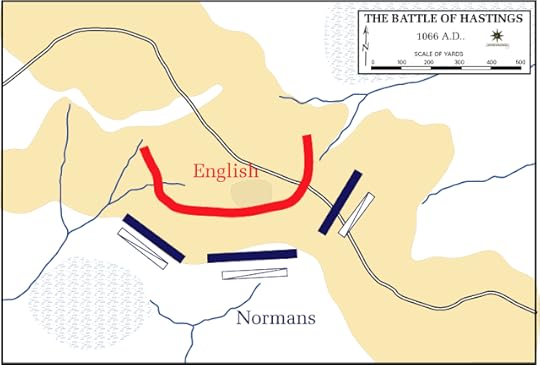
But with the battle lost and the king slain, it is only now that his real struggle begins as he returns home to find Normans have taken over his home, putting the lives of his kin at risk. Using just those few comrades he manages to gather to his cause, he must fight to rid his village of the enemy and, in so doing, save his aunt and sister from the clutches of Richard FitzGilbert.
Without giving too much away, books two and three (both of which should follow in 2021 from Sharpe Books), follow Thurkill’s adventures in the months and years after the Battle of Hastings as he tries to find his way in the new country that England has become. Whilst he yearns for a simple village life, tending the land and raising a family, he becomes increasingly aware of the growing excesses of the rapacious Norman overlords. Can he stand by and do nothing? Events will conspire to take the decision out of his hands.
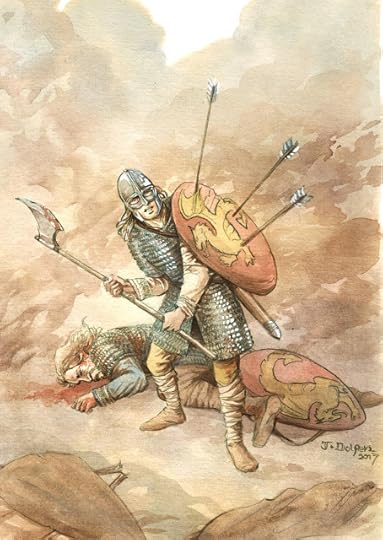
As far as inspiration is concerned, I have long wanted to be an author and I knew that – were I to ever realise that dream – it was always going to be historical fiction that I would write. History has fascinated me from a young age, the castles of north Wales in particular, had me in their grip. It was always my favourite subject at school as well, thanks in no small part to some truly inspirational teachers, and I was fortunate enough to be able to go on to study history at the University of Leeds where I focussed on the Anglo-Saxon era between the end of the Roman Empire and the coming of the Normans.
I had never really looked at this period before and I was fascinated from the off. That, combined with my love of most things Tolkein, was all the inspiration I needed. The Riders of Rohan were, for me, the huscarls of the Anglo-Saxon age. The similarity can be seen in their clothes, weapons and armour but also because in the code of honour and comradeship that binds them together under their leader, Eomer. The only slight misstep in that thinking being, of course, that huscarls might ride to reach a battle but, once there, the business of killing would be done on foot.
Mary Anne: 1066 was a momentous year for England. I have been to Hastings several times, the last time being in 2016 when English Heritage celebrated the battle’s 950th Anniversary. Why do you think this era in history continues to fascinate?
Paul Bernardi: That’s a great question, but I’m not sure if there is a definitive answer. Whilst being well-served in terms of books (both fact and fiction), I don’t believe that the events of 1066 have ever received the so-called, Hollywood treatment. Given how important that one year is in shaping the centuries that followed, I find it quite surprising that no one has yet come forward with a major film project for this era. Sean Bean could reprise his roles of Boromir and Ned Stark to play King Harold. On the flip side, we seem to get a new Robin Hood movie every few years (some of which – in my lowly opinion – we could well have done without).
Perhaps the fact that Shakespeare did not extend his histories to cover this period has not helped to secure a stronger place for it in popular culture? But, as you suggest, it is true to say that there have been few years as tumultuous as 1066 in the history of this nation over the last two thousand years or so. Through a combination of death in battle or subsequent dispossession, fewer than ten percent of those Saxons that were landowners in 1066 were still there by the time that the Domesday Book was written. Whether the Saxons liked it or not, the Normans had come, and they were there to stay. And we could spend many hours debating whether that was – on balance – a good or bad thing.
Mary Anne: What were the challenges you faced in researching this period of history and were there any unexpected surprises?
Paul Bernardi: Even though my time at university was more years ago than I care to mention, I did have a solid enough grounding in the period to have a good grasp of the main events surrounding 1066. That said, I always finding it amazing – when you start to really dig - how much of what you think you know is wrong and how much there is that you never knew at all.
Fortunately, I have always loved reading history books, so I would not call research a chore as such. That said, my natural impatience, often sees me having to fight the urge not to close the book and put finger to keyboard in my desire to start writing. I’m the same with new gadgets; I just want to start using them rather than bother with reading the manual. It doesn’t often end well.
A couple of things surprised me in my research. I had not appreciated just how close Edward the Confessor had been to the Normans before he became King of England. When his father, Aethelraed Unraed had lost the throne to the Danish invader, Knut, in 1016, Edward’s mother, Emma (who was, herself, sister to a Duke of Normandy) fled across the channel with her two young sons. Edward then spent the next 26 years growing up in the court of the Norman Dukes, living cheek by jowl with the likes of William and his father, Robert. Once he became king, he was not slow to bring Normans over to place in positions of authority (Robert of Jumieges becoming Archbishop of Canterbury to name but one example), perhaps to act as a counterbalance to the ever-increasing power of the Godwine family. So, it seems hardly surprising to me that he might, as suggested by Norman chroniclers, have offered the throne to William in 1051 in the event that he should die childless.
I was also interested to learn that the traditional story of Harold being killed by an arrow to the eye is, in fact, most unlikely. No other contemporary source mentions it and there is doubt about whether the tapestry even showed an arrow in its original incarnation. One of the most contemporary sources (the Carmen de Hastingae Proelio, or Song of the Battle of Hastings) tells how he was hacked down and brutally mutilated by a group of four Norman knights. Given that William needed to kill Harold to be certain of effecting regime change, this seems a far more probable scenario. But also, one that was much less likely to be depicted in the old Ladybird Kings and Queens of England series.
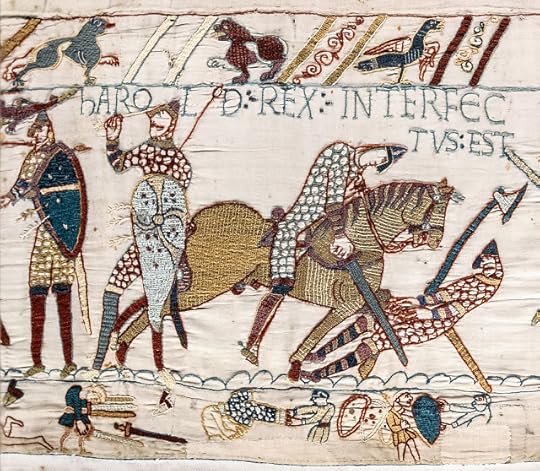
But by far the most interesting nugget I came across was the story of Edgar Aetheling whom you could say was the last Saxon King of England. His story also begins in 1016 when another of Aethelraed’s sons – Edmund Ironsides – led a short-lived campaign to save England from the Danish conquest. When he died later that year, his infant children, (another!) Edward and Edmund, were captured by Knut and sent to Sweden to be murdered. However, for reasons unknown, the Swedish king refused to do Knut’s dirty work and, instead, sent the young boys to Hungary. Edmund dies at some point, but Edward (known as The Exile, unsurprisingly) grows up, marries a Hungarian princess and has three children, one of whom is Edgar. When, in 1057, it looks likely that King Edward the Confessor will have no children, Edward the Exile returns to England, presumably invited by some court faction to be the next king. As a scion of the House of Wessex, he is better qualified than any to take the throne but – as luck would have it – he dies within days of his arrival (foul play cannot be ruled out, though the exact cause is unknown). He left behind his young son, Edgar, who would have been no more than about 5 at that time. In January 1066, it should have been Edgar who was acclaimed king, but he was overlooked by the Witan (the Council whose job it was to choose the next king). With the Normans threatening from the south, did they really want an unproven teenager leading their army? It was for this reason that Harold was chosen to be king in spite of his having no blood relation to the House of Wessex. But Edgar’s time would come, albeit briefly. Once Harold had been killed in battle, the surviving Saxon lords elected Edgar king. In Saxon law, election was all that was needed, whereas the Normans dated kingship from the day of the coronation. So, as Edgar was not formally crowned, and because the victors write the history, Edgar is never included in the lists of English monarchs. A little unfair if you ask me.
Finally, I was pleased to discover the inspiration for one of the most famous scenes in Monty Python’s Holy Grail film which took place during the siege of Exeter in early 1068. I’ll say no more (nudge nudge, wink wink) because I managed to include it in Book 3 and it wouldn’t do to spoil the fun.
Mary Anne: What do you think is the most challenging aspect of writing Historical Fiction?
Paul Bernardi: I think there are several things. Some might say that writing about a period about which comparatively little is known might be difficult, but I tend to like the freedom that this provides. I like to have the basic facts of the period as the skeleton on which I can then add the muscles, tendons and flesh of the story to form a complete body.
What I find harder, I suppose, is knowing when to cut down on the detail. I have long been accused of being someone who can be a bit wordy (you should see some of my work emails; I can only apologise to all those colleagues who have had to read them over the years). Achieving the balance between historical detail – which I think helps paint a realistic picture while giving the reader the reassurance of knowing that they are in the hands of someone who knows their subject – and keeping a pacy and exciting narrative can be hard. I am grateful to the guys at Sharpe Books for helping to point out those occasions when I perhaps get a little carried away. That said, my love of detail has often featured positively in several of the reviews I have received. Someone somewhere appreciates it, I suppose!
Finally, I think a significant challenge for me is the storyline. When I sit down to write a novel, I often have little idea of where I am going. I have a reasonable idea of where I will start and where I hope to end, but how I intend to get there is a mystery. In my more devilish moments, I see that as part of the fun. At other, more rational, times, it scares the hell out of me.
Mary Anne: What advice do you have for aspiring Historical Fiction authors?
Paul Bernardi: When I was starting out, I used to think that I could not write about a particular period, because someone else already had. This was one of the main reasons why I steered away from the seventh century (which had been the focus of my degree studies) because there were people doing great work already in that era (people like Matthew Harffy and Edoardo Albert for example). It took me a while to realise that what was most important was that you need to find your own story and tell it in your own way and not to be constrained by what others were doing. Perhaps one day, I’ll get back to the time of Kings Edwin, Raedwald and Aethelfrith.
I think the other thing for me is perseverance and discipline. Over the years I have been writing, I have got to know quite a few authors of different genres, and I am often impressed – and not a little dismayed – at how quickly they seem to churn out material. It may well be that I am just slow (I aim to have a book ready each year, work allowing), but I do feel that historical fiction requires a little more in the way of attention to detail. For me, you want to evoke something of the realism of the period in your story – to try and transport you reader from a drizzly Sunday afternoon on the sofa to the wet and wild landscape of eleventh century England. To do that, you need to do your homework: what would they have been wearing? Where would they have lived? What would they have cared about? All these things will help make your story a colourful romp through time.
 Only 0.99 on #Kindle for a Limited Time
Only 0.99 on #Kindle for a Limited TimeAmazon UK • Amazon US
Read for FREE with #KindleUnlimited subscription.


Paul Bernardi is an author of historical fiction. After leaving university in 1990 with a Masters’ degree in Anglo-Saxon studies, he began work for a major UK financial institution, though his passion for all things historical remained undiminished. Paul is the author of the Huscarl Chronicles series dealing with the Norman Conquest and its aftermath.
Connect with Paul:Website • Twitter • Facebook
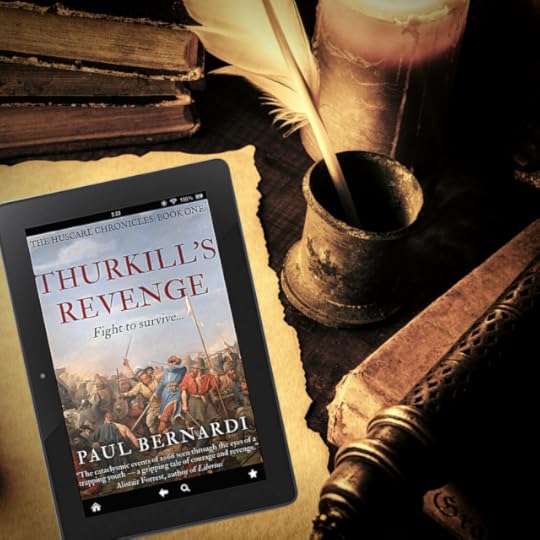
Welcome to Day #8 of the blog tour for Len Maynard's fabulous book — A Dangerous Life (DCI Jack Callum Mysteries Book 2) #HistoricalFiction #Crime @len_maynard

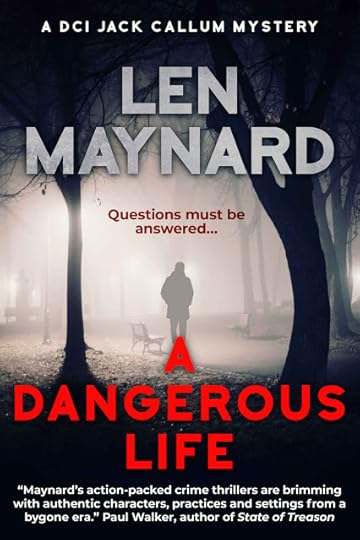
February 8th – April 12th 2021
Publication Date: 28th July 2020Publisher: Sharpe BooksPage Length: 287 PagesGenre: Historical Crime Fiction1959
A body of a man wearing theatrical make up is found hanging from a tree on Norton Common in Hertfordshire. He has been tortured and his throat has been cut.
DCI Jack Callum, a veteran policeman with his own rules for procedure, heads the investigation into this puzzling crime. The clues lead him close to the answer, but the solution remains elusive.
Why was the man killed?
What were the victim’s links to London’s gangland bosses?
When an unsolved murder is uncovered that appears to be connected to the case, Jack realises he must use his team to their full strength to separate the innocent from the guilty.
Jack also faces a challenge he never expected as he is accused of an improper relationship with a young Detective Constable on his team, Myra Banks.
In a breathless climax, Myra puts her own life on the line to deal with a figure from Jack’s past, who has now become a lethal threat in the present.
Head on over to The Magic of Wor(l)ds for an exclusive interview.
Click HERE.
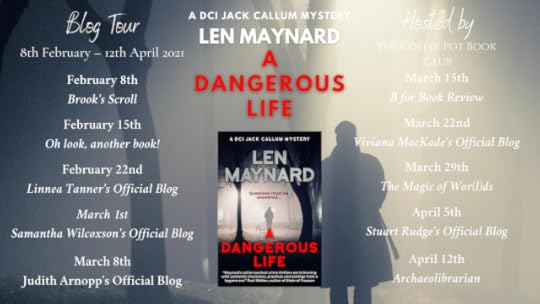

Welcome to Day #2 of the blog tour for Pied Piper by Keith Stuart #HistoricalFiction #WW2 #BlogTour @len_maynard

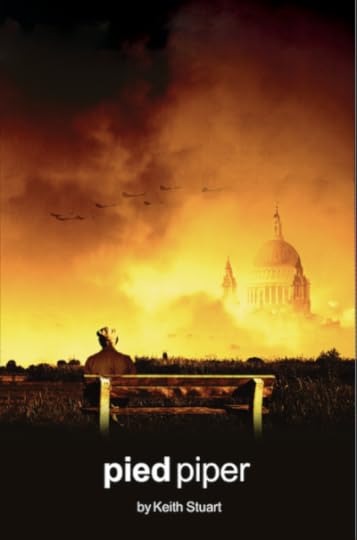
March 22nd – May 24th 2021
Publication Date: 1st March 2021Publisher: LMP- Len Maynard Publishing
Page Length: 176 Pages
Genre: Historical Fiction / WWII
In September 1939 the British Government launched Operation Pied Piper. To protect them from the perils of German bombing raids, in three days millions of city children were evacuated - separated from their parents.
This story tells of two families: one whose children leave London and the other which takes them in. We share the ups and downs of their lives, their dramas and tragedies, their stoicism and their optimism. But. unlike many other stories and images about this time, this one unfolds mainly through the eyes of Tom, the father whose children set off, to who knew where, with just a small case and gas mask to see them on their way.
Pied Piper is in the spotlight today, over on Oh look, another book!
Click HERE.
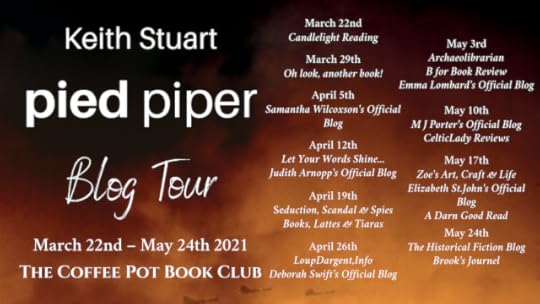

Welcome to Day #9 of the blog tour for The Bridled Tongue by Catherine Meyrick #HistoricalFiction #BlogTour #CoffeePotBookClub @cameyrick1

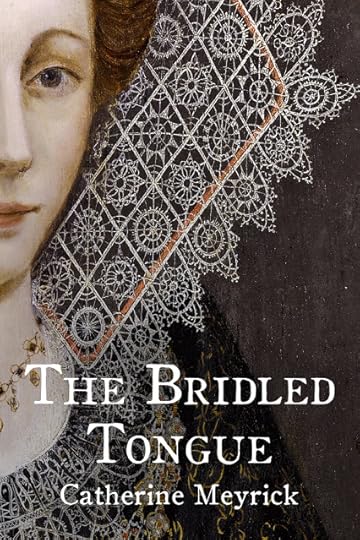
1st February – 5th April 2021
Publication Date: 1st February 2020Publisher: Courante Publishing
Page Length: 358 pages
Genre: Historical Fiction/Women’s Fiction
England 1586.
Alyce Bradley has few choices when her father decides it is time she marry as many refuse to see her as other than the girl she once was--unruly, outspoken and close to her grandmother, a woman suspected of witchcraft.
Thomas Granville, an ambitious privateer, inspires fierce loyalty in those close to him and hatred in those he has crossed. Beyond a large dowry, he is seeking a virtuous and dutiful wife. Neither he nor Alyce expect more from marriage than mutual courtesy and respect.
As the King of Spain launches his great armada and England braces for invasion, Alyce must confront closer dangers from both her own and Thomas's past, threats that could not only destroy her hopes of love and happiness but her life. And Thomas is powerless to help.
Death and life are in the power of the tongue.
We are stopping over on The Whispering Bookworm for a fabulous review
Click HERE!
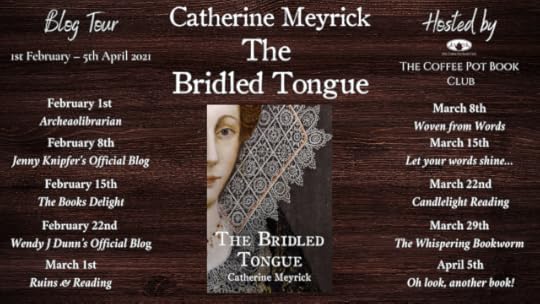

The Coffee Pot Book Club
...more
- Mary Anne Yarde's profile
- 159 followers



